-10% Descuento en reserva de plaza para curso 25/26 ¡Solo hasta el 31 de julio!
El Grado en Ingeniería en Sistemas Industriales es un programa de cuatro años que ofrece una formación integral en el ámbito industrial. Este grado es único al proporcionar cuatro itinerarios habilitantes para ejercer la profesión de ingeniero técnico industrial: mecánica (máquinas y automoción), y electrónica industrial (automática y robótica), y la posibilidad de realizar dos dobles especialidades, te preparará para destacar en el competitivo mundo industrial. Está diseñado para ofrecer al estudiante más oportunidades para su futuro profesional.
En solo cuatro años, te prepararás para liderar la transformación de la industria con una formación práctica, innovadora y adaptada a los retos de la digitalización y la Industria 4.0.
Título oficial emitido por Universidad Europea de Madrid
| Presencial | Villaviciosa de Odón | 4 años, 240 ECTS | Inicio: 15 sep. 2025 | Escuela de Arquitectura, Ingeniería, Ciencia y Computación - STEAM |
Este grado te prepara para un futuro donde la tecnología y la innovación son protagonistas. A través de un enfoque práctico y vanguardista, adquirirás los conocimientos y habilidades para diseñar, construir y optimizar sistemas industriales clave en múltiples sectores. Además, podrás elegir entre varias menciones especializadas, adaptando tu formación a tus intereses y aspiraciones profesionales. Sea cual sea la especialización que elijas, contarás con una profesión regulada por los colegios oficiales de graduados e ingenieros técnicos industriales, lo que te abrirá un mundo de oportunidades en un mercado global en constante evolución.
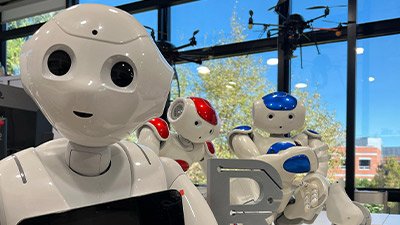
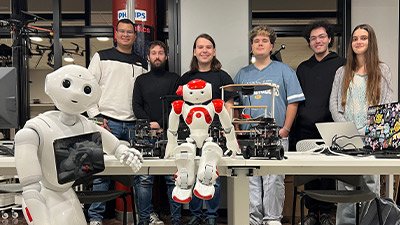
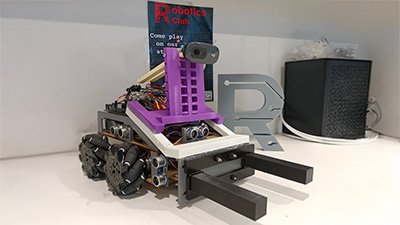
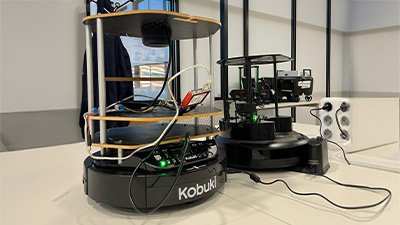
Entrevistamos a Xevi Pujolar, quien comparte valiosos consejos y destaca la importancia de estudiar. Descubre cómo esta titulación puede abrirte puertas en el mundo profesional y proporcionarte las habilidades necesarias para destacar en el sector.
Con el Grado en Ingeniería de Sistemas Industriales de la Universidad Europea, tú eliges tu camino. Fórmate en un entorno práctico e internacional y especialízate en una de las 4 ramas habilitantes: mecánica, electrónica, automoción y robótica. Da el primer paso hacia un futuro sin límites.
Obtener la certificación en SOLIDWORKS en diseño mecánico y validación de diseños es el reconocimiento que demuestra tu experiencia y habilidades como profesional. Al graduarte con esta certificación, te diferencias del resto, validas tus conocimientos con un examen oficial y aceleras tu incorporación al mundo laboral. ¡Da el paso y asegura tu futuro hoy!
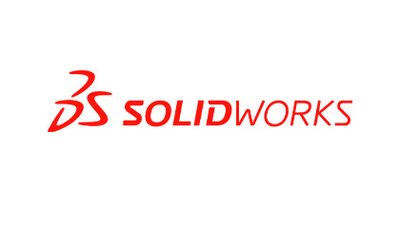
Fórmate como un ingeniero del futuro
En el Grado en Ingeniería de Sistemas Industriales, adquirirás una base sólida en ciencias e ingeniería, aplicando tecnología avanzada en proyectos reales. A lo largo de cuatro años, aprenderás a resolver retos industriales, innovar y liderar en el sector tecnológico, combinando formación práctica con especializaciones en áreas estratégicas que impulsarán tu carrera y te diferenciarán en el mercado laboral.
Elige la Ingeniería que más te apasione: Mecánica (habilitante), Electrónica y Automática (habilitante), Automoción, Robótica, Tecnologías Industriales. Además, es el único grado que te ofrece la posibilidad de obtener una doble mención en 4 años, la misma duración que un solo grado.
Mira el plan de estudios del curso 24/25
View the curriculum in English
1º curso
| Materia | ECTS | Tipo | Idioma de impartición |
|---|---|---|---|
| Cálculo I | 6 | Básica | Español (es) |
| Fundamentos de informática para la ingeniería | 6 | Básica | Español (es) |
| Expresión gráfica para Ingeniería | 6 | Básica | Español (es) |
| Álgebra | 6 | Básica | Español (es) |
| Física mecánica | 6 | Básica | Español (es) |
| Habilidades de comunicación | 6 | Obligatoria | Español (es) |
| Química para la ingeniería | 6 | Básica | Español (es) |
| Ciencia de los materiales | 6 | Obligatoria | Español (es) |
| Cálculo II | 6 | Básica | Español (es) |
| Proyecto integrador: Física electromagnética | 6 | Básica | Español (es) |
2º curso
| Materia | ECTS | Tipo | Idioma de impartición |
|---|---|---|---|
| Estadística para ingeniería | 6 | Básica | Español (es) |
| Termodinámica y transmisión de calor | 6 | Obligatoria | Español (es) |
| Teoría de circuitos | 6 | Obligatoria | Español (es) |
| Fundamentos de organización de empresas | 6 | Básica | Español (es) |
| Proyecto integrador: teoría de máquinas y mecanismos | 6 | Obligatoria | Español (es) |
| Sistemas de calidad y gestión medioambiental | 6 | Obligatoria | Español (es) |
| Fundamentos de electrónica | 6 | Obligatoria | Español (es) |
| Proyecto integrador: automatismos y control | 6 | Obligatoria | Español (es) |
| Mecánica de fluidos | 6 | Obligatoria | Español (es) |
| Sistemas de producción industrial | 6 | Obligatoria | Español (es) |
3º curso. Asignaturas comunes
| Materia | ECTS | Tipo | Idioma de impartición |
|---|---|---|---|
| Elasticidad y resistencia de materiales | 6 | Obligatoria | Español (es) |
| Máquinas eléctricas | 6 | Obligatoria | Español (es) |
3º Mención electrónica industrial. Automática
| Materia | ECTS | Tipo | Idioma de impartición |
|---|---|---|---|
| Electrónica analógica | 6 | Optativa | Español (es) |
| Informática industrial y comunicaciones | 6 | Optativa | Español (es) |
| Automatización industrial | 6 | Optativa | Español (es) |
| Regulación automática | 6 | Optativa | Español (es) |
| Proyecto integrador: robótica industrial | 6 | Optativa | Español (es) |
| Sistemas con microprocesadores | 6 | Optativa | Español (es) |
| Instalaciones industriales | 6 | Optativa | Español (es) |
| Organización de la producción | 6 | Optativa | Español (es) |
3º Mención electrónica industrial. Robótica
| Materia | ECTS | Tipo | Idioma de impartición |
|---|---|---|---|
| Electrónica analógica | 6 | Optativa | Español (es) |
| Informática industrial y comunicaciones | 6 | Optativa | Español (es) |
| Automatización industrial | 6 | Optativa | Español (es) |
| Regulación automática | 6 | Optativa | Español (es) |
| Proyecto integrador: robótica industrial | 6 | Optativa | Español (es) |
| Sistemas con microprocesadores | 6 | Optativa | Español (es) |
| Robótica móvil | 6 | Optativa | Español (es) |
| Diseño mecánico para robots | 6 | Optativa | Español (es) |
3º Mención mecánica. Automoción
| Materia | ECTS | Tipo | Idioma de impartición |
|---|---|---|---|
| Ingeniería térmica | 6 | Optativa | Español (es) |
| Ingeniería de Materiales | 6 | Optativa | Español (es) |
| Proyecto integrador: ingeniería gráfica | 6 | Optativa | Español (es) |
| Procesos de fabricación | 6 | Optativa | Español (es) |
| Proyecto Integrador: diseño de Máquinas | 6 | Optativa | Español (es) |
| Máquinas hidráulicas | 6 | Optativa | Español (es) |
| Dinámica vehicular I | 6 | Optativa | Español (es) |
| Dinámica vehicular II | 6 | Optativa | Español (es) |
3º Mención mecánica. Máquinas
| Materia | ECTS | Tipo | Idioma de impartición |
|---|---|---|---|
| Ingeniería térmica | 6 | Optativa | Español (es) |
| Ingeniería de Materiales | 6 | Optativa | Español (es) |
| Proyecto integrador: ingeniería gráfica | 6 | Optativa | Español (es) |
| Procesos de fabricación | 6 | Optativa | Español (es) |
| Proyecto Integrador: diseño de Máquinas | 6 | Optativa | Español (es) |
| Máquinas hidráulicas | 6 | Optativa | Español (es) |
| Instalaciones industriales | 6 | Optativa | Español (es) |
| Organización de la producción | 6 | Optativa | Español (es) |
4º curso. Asignaturas comunes
| Materia | ECTS | Tipo | Idioma de impartición |
|---|---|---|---|
| Ejercicio profesional del ingeniero | 6 | Obligatoria | Español (es) |
| Trabajo fin de grado | 12 | TFG | Español (es) |
| Prácticas académicas externas | 12 | PAE | Español (es) |
| Ampliación de prácticas académicas externas | 6 | Optativa | Español (es) |
| Actividades universitarias | 6 | Optativa | Español (es) |
4º Mención electrónica industrial. Automática
| Materia | ECTS | Tipo | Idioma de impartición |
|---|---|---|---|
| Electrónica de potencia e instrumentación electrónica | 6 | Optativa | Español (es) |
| Diseño de circuitos asistido por ordenador | 6 | Optativa | Español (es) |
| Ingeniería de control | 6 | Optativa | Español (es) |
| Proyecto integrador: sistemas de percepción | 6 | Optativa | Español (es) |
4º Mención electrónica industrial. Robótica
| Materia | ECTS | Tipo | Idioma de impartición |
|---|---|---|---|
| Otras aplicaciones de la robótica | 6 | Optativa | Español (es) |
| Proyecto integrador: fabricación de un robot | 6 | Optativa | Español (es) |
| Electrónica de potencia e instrumentación electrónica | 6 | Optativa | Español (es) |
| Diseño de circuitos asistido por ordenador | 6 | Optativa | Español (es) |
4º Mención mecánica. Automoción
| Materia | ECTS | Tipo | Idioma de impartición |
|---|---|---|---|
| Vehículo eléctrico | 6 | Optativa | Español (es) |
| Simulación y ensayos en automoción | 6 | Optativa | Español (es) |
| Estructuras y Construcciones Industriales | 6 | Optativa | Español (es) |
| Elasticidad y Resistencia de Materiales II | 6 | Optativa | Español (es) |
4º Mención mecánica. Máquinas
| Materia | ECTS | Tipo | Idioma de impartición |
|---|---|---|---|
| Mantenimiento industrial | 6 | Optativa | Español (es) |
| Motores de combustión interna | 6 | Optativa | Español (es) |
| Estructuras y Construcciones Industriales | 6 | Optativa | Español (es) |
| Elasticidad y Resistencia de Materiales II | 6 | Optativa | Español (es) |
1
Este primer año te dará las herramientas esenciales para comprender el mundo de la ingeniería y sentar las bases de tu desarrollo técnico y analítico.
2
En el segundo año, llevarás tus conocimientos a un nivel más avanzado, aplicándolos en situaciones reales dentro de la ingeniería.
3
A partir de este año, consolidarás tu perfil profesional con asignaturas avanzadas y la elección de una mención en tu área de interés.
4
En el último año, aplicarás todo lo aprendido en entornos reales y desarrollarás tu proyecto final, consolidando tu preparación para el mercado laboral.
Las prácticas profesionales son el paso clave para transformar tus conocimientos en soluciones reales. En el Grado en Ingeniería de Sistemas Industriales aprenderás a optimizar procesos, mejorar la eficiencia y liderar proyectos tecnológicos para posteriormente ponerlo en práctica en empresas líderes como Siemens, Airbus, Acciona, Talgo o Naturgy.
Imagina trabajar en entornos donde la innovación es el día a día, rodeado de expertos que te guiarán y desafiarán a superarte. Aprenderás a tomar decisiones estratégicas, enfrentarte a retos industriales reales y desarrollar las habilidades que te convertirán en un profesional preparado para la industria Inteligente.
Consulta el listado de empresas aquí
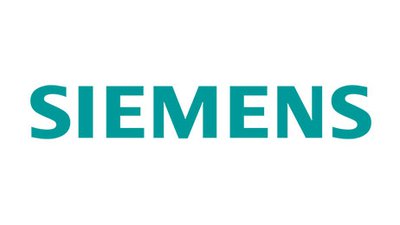
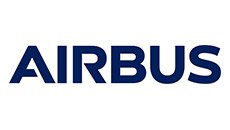
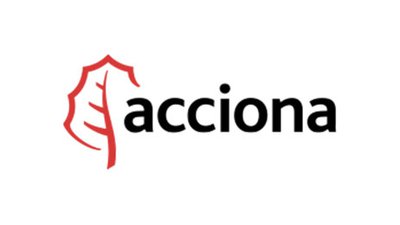
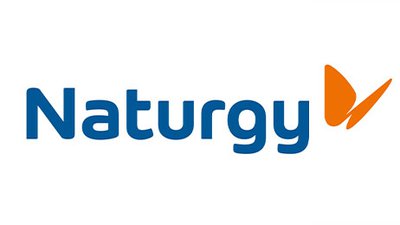
200 nuevas plazas.
Título implantado en 2017/2018.
Las prácticas en empresas son un elemento clave en tu formación. Adquirir experiencia después de lo aprendido en tu titulación, es la mejor forma de entrar en el mercado laboral. Hay dos tipos de prácticas, las curriculares (incluidas en tu plan de estudios) y extracurriculares (las que puedes hacer de forma voluntaria).
Para realizar las prácticas curriculares en empresas, necesitarás tener el 50% de los créditos aprobado y matricular la asignatura antes de comenzar tus prácticas. Estas prácticas llevan un seguimiento por parte de la empresa y del profesor de prácticas, así como la realización de informes intermedios y finales para su evaluación.
Si quieres mejorar tu experiencia laboral antes de concluir tu formación universitaria, puedes hacer prácticas extracurriculares. Podrás hacerlas en cualquier curso pero te recordamos que las prácticas son un complemento formativo a tus estudios; por tanto, cuanto más conocimiento hayas adquirido a lo largo de la carrera, mayor provecho sacarás de la experiencia de prácticas.
El claustro del grado se compone de un 71,4% de doctores.
5
Primera universidad privada en obtener las 5 Estrellas en las 10 categorías del Rating QS Stars.
30
Largo recorrido comprometidos con construir el futuro de la educación superior.
130.000
Contamos con una comunidad formada por más de 130.000 antiguos alumnos de todo el mundo.
Top 5
Estamos en el "Top 5" de las mejores universidades privadas de España según El Mundo.
Comienza tu futuro en la Universidad Europea
Sabemos que elegir qué estudiar es una de las decisiones más importantes de tu vida. Por ello, tienes a tu disposición un equipo asesor que te ayudará en todo el camino.
En 3 pasos puedes convertirte en un alumno de la Universidad Europea.
1
Inicia tu proceso llamando a 917407272 o solicita información y nuestros asesores se pondrán en contacto contigo.
2
Una vez admitido podrás abonar tu reserva de plaza para garantizarla.
3
Entrega la documentación necesaria para formalizar tu matrícula.
Programa de becas y ayudas
Queremos ayudarte con una amplia selección de becas propias y oficiales para que te conviertas en estudiante de la Universidad Europea.
Convalidaciones y traslados de centro
No tienes por qué seguir en algo que no te gusta. Por eso hemos diseñado planes específicos de convalidaciones y traslados de centro.
Solicita tu estudio de convalidaciones online para cambiar tu expediente y comenzar tus estudios en la Universidad Europea.
El perfil recomendado para los estudiantes de nuevo ingreso que cursen este grado es el de un bachiller con el itinerario de “Ciencias” o “Ingeniería y Arquitectura", con vocación tecnológica. Una persona rigurosa, con ganas de aprender haciendo y que disfruta relacionando diferentes disciplinas y asumiendo retos.
Podrán acceder a los estudios de grado los estudiantes según los accesos establecidos en el RD 1892/2008, de 14 de noviembre y legislación vigente aplicable, en concreto:
Los alumnos estudiantes de Bachillerato de sistemas educativos de Estados miembros de la Unión Europea y de otros países con los que se hayan suscrito acuerdos internacionales al respecto, podrán acceder al Grado siempre que en su sistema educativo tengan acceso a la universidad.
Los estudiantes de otros países que no tengan acuerdo internacional suscrito, deberán homologar sus estudios y realizar la/s prueba/s de acceso a la universidad.
También podrán tener acceso al grado los mayores de 40 años que, sin disponer de titulación que les permita el acceso a la universidad, acrediten una determinada experiencia laboral o profesional en relación con el grado al que pretenden acceder.
Participa en nuestros Open Days para conocer de primera mano nuestro avanzado modelo académico de aprendizaje experiencial, al equipo docente que ya piensa en tu futuro, los distintos programas de formación que ponemos a tu disposición y como comenzarás tus estudios este próximo curso académico.
12 Julio
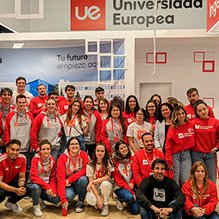
Conoce las instalaciones y descubre por qué la Universidad Europea está hecha para ti.
El Grado en Ingeniería en Sistemas Industriales es una titulación universitaria que de la rama industrial que combina la formación técnica (1º y 2º cursos) con la especialización en las ramas de mecánica, electrónica, automoción o robótica. Este programa prepara a los estudiantes para el desarrollo de máquinas y productos, aumentando la eficiencia y productividad en los sectores industriales, equipándolos para enfrentar los desafíos de la industria moderna.
El Grado en Ingeniería de Sistemas Industriales ofrece una educación integrada de teoría y práctica en disciplinas como robótica, automatización industrial, vehículo eléctrico, motores de combustión u organización de la producción. El programa enfatiza la resolución de problemas industriales reales a través de proyectos y laboratorios, preparando a los estudiantes para aplicar conocimientos técnicos en entornos industriales reales.
El Grado en Ingeniería de Sistemas Industriales se centra en desarrollar habilidades como pensamiento crítico, resolución de problemas y liderazgo. Prepara a los estudiantes para analizar y diseñar sistemas industriales complejos, gestionar equipos y aplicar tecnologías avanzadas para mejorar la eficiencia operativa, equipándolos para liderar en el sector industrial dinámico.